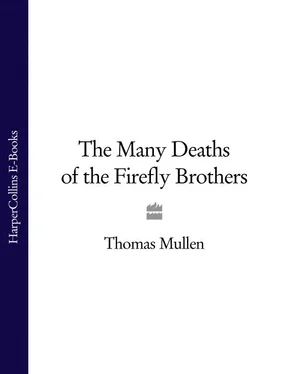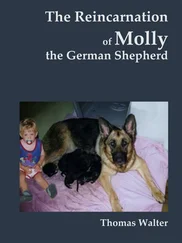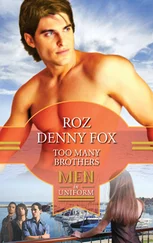“Evenin’,” Jason said after shutting off the engine. “I’d like two dollars’ worth, please.”
“All righty.” After the kid grabbed the spigot and fastened it to the Pontiac, he asked if they’d heard the news.
“What news is that?”
“They killed the Firefly Brothers, late last night.”
“That right?”
“S’all over the radio. Local boys did it, not the feds. Caught ‘em at some farmhouse in Points North. Shot ‘em up real good. Brothers took a cop with ‘em, though.”
“How ‘bout that.” Jason looked down at the pavement. “Radio say if they killed the brothers’ girls, too?”
The kid thought for a moment. “I don’t remember. That’d be a shame, though,” and he offered a gawky grin. “They’re real lookers.”
“They certainly are.”
“Can’t believe they killed the Firefly Brothers, though. Gonna cost me a two-dollar bet to my own brother—I said they’d never be caught.”
“They’re always caught eventually. Sorry to hear about your two bucks.”
“Tell me about it.”
They were silent as the tap clicked every few seconds. The smell of gasoline seeped through Jason’s window.
“Two dollars’ worth,” the kid said, placing the handle back on the latch.
Jason handed the kid a five with his un-inked hand and pocketed the change. Then he looked the kid in the eye and extended his hand again. “And here’s your two bucks.”
“Huh?”
“For losing your bet. Pay this to your brother.”
The kid looked at him strangely. “That’s kind of you, sir, but I’ll be all right.”
“I don’t like hearing about young lads already in debt. Take it and pay your brother.”
The kid seemed distracted by the way the bills hung in Jason’s perfectly still hand. Then he was looking at Jason again, his eyes spotlights. Jason’s lips curved into the barest smile.
“Thank you, sir.”
“You’re welcome.” Jason turned the ignition. “Night.”
After they’d pulled onto the road, Whit looked up. “Did the kid look funny at all?”
“What do you mean?”
“I don’t know, maybe everyone else out here is dead, too. Maybe this is the afterlife.”
“That explains the hoop floating over his head.”
“Go to hell.”
“Maybe we’re there already. Besides, I thought you didn’t believe in an afterlife.”
Whit scanned the horizon. “Well this is the kind of thing that shakes a man’s unfaith.”
Jason pulled back onto the highway and the sky flashed, light filling its vast spaces before vanishing again.
“We have to learn more about what happened,” Whit said.
“We’ll read the papers tomorrow.”
“I’m worried about Ronnie, and little Patrick. You don’t suppose…they might have been there, too, maybe in another room?”
Jason let himself laugh. “I don’t think they have separate women-and-children morgues, Whit.”
“This isn’t goddamn funny!”
Jason waited a beat. “Don’t think about it, all right? As soon as we get home we’ll send a telegram to the girls and figure out what’s what.”
The window was still open and he could smell the rain before the drops started hitting the windshield. The drumming grew louder and the wipers struggled to keep up. Jason left his window rolled down, letting the water soak the sleeve of his stolen shirt, the drops wetting his hair and catching in his eyelashes. The rain was filling his side of the cabin now, the sound almost too loud to be believed.
The sun rose grudgingly, as if it would have preferred to stay in hiding. Jason intermittently checked its progress over the familiar, softly sloping landscape of southern Ohio before finally admitting he was awake.
“Good morning,” Whit said when he noticed his brother rustling.
Jason grunted in return. He sat up straighter. The feeling of his stolen shirt tugging slightly against the bandages on his chest told him it hadn’t been a dream.
Though for the first few hours the brothers had felt charged with adrenaline and bewilderment, they had grown tired as their drive unfolded into the night. They chose to sleep in shifts, aiming to make it home as quickly as possible.
“Home” referred to the Lincoln City house they had grown up in. They hadn’t lived there in years, but nothing had taken its place in terms of either permanence or significance—even though their other brother, who still lived in Lincoln City, made them feel less welcome every time they visited.
They desperately wanted to find Darcy and Veronica and let them know they were all right, or alive, or whatever they were, but that seemed too risky. If the girls thought the brothers had been caught, it would be hard to predict how they would react. Go into hiding? Surrender to the police? There was also a chance the cops had been watching the girls all along, and had somehow gleaned information from their movements that had led to the brothers’ “apprehension.”
With their wounds bandaged up and the scene of their ghastly awakening many miles behind them now, it was easier to tell themselves that there was some other explanation for this. The morning’s clarity only heightened the previous night’s dreamlike quality, and Jason and Whit both sat there in the car, hoping that this soon would make sense, hoping that God had granted them some startling favor. Or maybe the Devil had held up his end of an already forgotten bargain—that was more believable. And so they were merely trying to act the way they normally would when pursued by forces beyond their control—something with which they had considerable experience.
Over the past few months—ever since the federal government had made the elimination of “Public Enemies” a priority, like reducing unemployment and stabilizing the dollar—the brothers had been transformed from local criminals of modest repute to world-famous outlaws, as newspapers across the country printed exaggerated versions of their life stories. Jason was flattered until the drawbacks became clear: safe houses started turning the brothers away, and wary associates showed declining interest in future heists. Worse, the type of regular folk who used to put up Jason and Whit whenever breakdowns or blown tires left them stranded in the middle of farm country—the people who were grateful for the hideout money the brothers paid them and who praised their efforts against the banks—were now too tempted by the government’s bounty on the Firefly Brothers’ heads. Back in May, when the gang had pulled a job at the Federal Reserve in Milwaukee, Jason and Whit had barely survived when random civilians started taking potshots at them; one of their associates wasn’t so lucky.
At least the bloody Federal Reserve job had been their most lucrative yet: a hundred and fifty grand, to be divided among the four surviving members of the Firefly Gang. The money, however, was easily traceable and therefore needed to be washed. Which was a problem: launderers were even more skittish around the brothers than safe houses were. Sorry, they all begged off, you’re too hot. The gang split ways as Jason and Whit tried to find a reliable, less cowardly fence. There followed weeks of hiding out, of exhausting the goodwill and bad judgment of old pals, of waking to late-night police raids and sneaking through early-morning stakeouts. One fence who claimed he could help them had turned rat, setting them up for a meeting at a Toledo restaurant that was surrounded by feds. Jason had pulled off a brilliant escape that time, but barely. Finally, he and Whit had fallen so low as to live in a car, sleeping in their clothes and bathing in creeks. Jason Fireson, the silk-suit bandit, had become unwashed and unshaven. Carrying six figures of unspendable bills on his rather foul person.
Читать дальше












